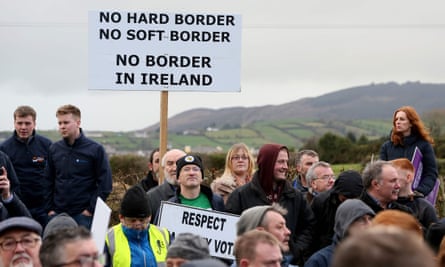One of my earliest childhood memories is of a circling red light motioning cars to stop near the border, silencing all who encountered its fiery glare. That red light filled my young heart with fear. I didn’t know if the gloved hand holding the torch was that of the RUC, the British army, the IRA or the UVF.
I grew up during the Troubles in the shadow of Cloghogue, one of the largest British army bases in Northern Ireland. Having to make detours to avoid customs and security checks along “bomb alley” – an atrocity-laden eight-mile stretch of road between Newry and Dundalk – was as frightening as it was familiar.
It still is: to this day there are some back roads in South Armagh that I will not drive on alone after dark. It’s hard to explain to those who have not lived through a conflict that claimed more than 3,500 lives, in a region with a smaller population than most large UK cities, how the border permeated every aspect of our lives.
It’s also hard to explain why the Brexit backstop – an insurance policy proposed between the EU and the UK to avoid a hard border, and extended to the whole of the UK at the latter’s insistence – is so critical. As the business editor of the largest media group in Ireland, I can give you chapter and verse about the economic threats a hard or no-deal Brexit poses for the Irish, Northern Irish and British economies. But you know about those already.
The reality is that no amount of economic modelling can capture the unquantifiable human and psychological costs of the return of a hard border. Many argue that technological solutions – drones and suchlike – will do the trick. This is farcical: you only eliminate physical checks between two territories separated by a border when they share a customs union and have broad regulatory alignment. Everything else is infrastructure.

As a journalist, I have been staggered by the scale and speed at which dangerous stereotypes and vituperative tropes – in some cases barely concealed racism – surrounding Ireland’s supposed intransigence have resurfaced in the UK’s political and media discourse. This process has been accompanied by astonishment in some quarters that Ireland, arguably England’s oldest colony, is a saboteur, reprobate or badly behaved underling for refusing to fall into line with the UK’s demands, if we knew what they were. When the BBC’s John Humphrys, one of the most prominent public broadcasters in Britain, asked Ireland’s Europe minister, Helen McEntee, why “Dublin” didn’t just leave the EU and “throw in their lot with this country”, Ireland uttered a collective gasp of incredulity verging on despair. What’s more alarming is that Anglo-Irish political relations, having warmed to a zenith of sorts in recent years, have plunged into a rapid freeze in a matter of months.
I’ve worked hard to understand the rationale of those who voted to leave. But I’m saddened and alarmed at how the lives of those who will be most affected by Brexit have been callously cast aside; how the heartfelt and evidence-basedfears about the border have been mocked and derided. Brexiteers tell us that the customs union and the single market have nothing to do with the Good Friday agreement, the nearly 21-year-old, consent-based international peace deal that placed the constitutional destiny of the divided communities of Northern Ireland – 56% of whom voted to remain in 2016 – in our own hands. They are wrong.
Those who want to tear up the backstop, or feel gleeful at the prospect of no deal, should recall that the first shots of the Troubles were fired at customs posts such as Newry, requiring the RUC, and later the British army, to protect officials, civilians and military alike. These incidents paved the way for the installation of those mammoth watchtowers, helicopter bases and checkpoints – the hard border – that blighted our landscape. Just as the first shots were fired over customs posts, it was our membership of the customs union and the single market – the free movement of goods and people – that allowed us to tear down the physical borders and begin the task of demolishing the walls in our hearts and minds.
Is a return to violence – the recent car bomb in Derry felt like a terrifying foreshock – inevitable? Not necessarily. But the return of a border, even one that starts out as soft and virtual, will – like the customs posts of old – invite a regulatory and security mission creep that will disrupt lives and livelihoods and prove tempting for some who are intent on taking us back to darker times.
It’s a gamble we can’t afford to take. The Brexit backstop – this fundamental need to avoid a border, rightly articulatedin stark, if belated and obvious terms at Davos by the taoiseach, Leo Varadkar – is about so much more than tariffs and trade. It is about our identity. Brexit tears at the heart of the Good Friday agreement, which allows people like me, a Catholic who grew up in Newry, or a loyalist from east Belfast, to identify as British, Irish or both – and to celebrate our different allegiances.
I can say, as an Irish woman from Northern Ireland, that I am Irish-British: in another time, I would have been tarred and feathered for saying so. Brexit strips away at those coveted birthrights. A border will force us, once again, to choose sides. As we stare down the barrel of Brexit, Theresa May has opened another front, securing parliamentary support to reopen the withdrawal agreement and demand significant and legally binding changes to the backstop that she vigorously defended for months.
The prime minister may have scored a short-term pyrrhic victory in the internecine wars that have divided her party and the UK parliament. But backtracking on the backstop is a mistake, and a dangerous one at that. Placing party politics and political survival above the peace process is a risk we cannot afford to take.

